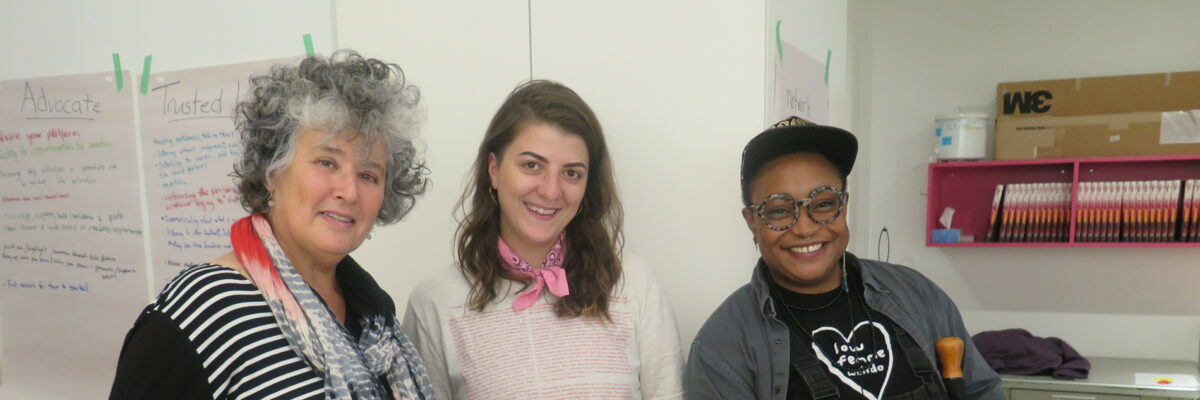How to be Mentored

Mentor Amy Karlinsky, Christina Hajjar and mel monoceros
A mentor is:
- an experienced professional with relevant skills
- someone who generously shares knowledge and contacts while providing advice, reinforcing what is working and offering constructive critique
- an attentive listener
A mentor isn’t:
- a therapist
- a parent
- someone who tells you what to do and how to do it
- someone who will “make you” an instant success!
Mentorship requires the mentee to be active. Don’t wait for your mentor to lead. Call them to set up meeting times. Let them know how you would like to spend the time together. Set the agenda.
Do your research. Take the time to find out who is mentoring you. Look up their work. Read their bio. Think about what you can learn from them.
Getting started (setting goals)
It is very helpful if you and your mentor develop goals for the mentorship together and write them down. This way you will both be “on the same page”. Of course things will change along the way, but having goals and a workplan (timelines) is a great starting point and a tool you can use to measure progress. See the attached goals template - Word document.
- think about what you want to achieve… what is your priority for the upcoming three months, six months, year?
- be realistic, but at the same time challenge yourself
- set concrete timelines/benchmarks
- be specific (for example “apply for one grant, apply for one professional opportunity, take a workshop, read essays by a specific author” is more helpful than “advance my practice”)
- if you find yourself feeling overwhelmed, break goals down into manageable components/tasks
- dedicating time to your practice is essential to achieving your goals; sometimes it helps to be specific (i.e. every Tuesday and Thursday, 7-9 pm)
“When I was mentored by Rebecca Belmore in 2006, I had been working on several mediums at the same time, including working with salt brine that I poured over various objects and allowed to crystallize to create salt encrusted art objects. While I liked the work I was making, I was discouraged at the feedback I was receiving about this work and was planning to abandon this part of my practice. Rebecca strongly encouraged me not to give up. It has proved to be the best advice I have been given and allowed me to learn to trust my instincts and to follow where my art leads me.”
– Elvira Finnigan
Ingredients for Effective and Ineffective MentorshipsMeetings
Be prepared for all meetings. You are meeting with a professional in your field! Be professional. Use the time together wisely.
Think about how you want to articulate your concerns. Tell them what you make and importantly why you make it. What is unique about your work (technically, conceptually, point of view)? Be concise. You want your time together to consist of an exchange of thoughts and ideas.
It can be helpful, in advance of a one-on-one meeting, to prepare approximately 5 questions. Write them down. A mentor cannot intuitively know what you want or need.
During meetings with your mentor, actively listen so if the conversation leads you in another direction that is interesting, you can follow it. Or use your questions to bring the conversation back to what you want to know. Ask yourself: if I could ask an established artist anything, what would it be? Don’t be shy. Your mentor wants to help you, so ask what you want to know.
Remember the range of things a mentor can provide (this list and more!):
- perspective on goals and plans
- critique of work
- professional advice
- resources and research material
- contacts
- motivation
- a challenge
The more time, effort and energy you put into the mentorship, the more you will get out of it.
See a list of ingredients of effective and ineffective mentorships or download the Word document.
Take risks
A mentorship is an opportunity to stretch, grow and experiment. Remember that “failure” is part of learning. You have your mentor’s support.

